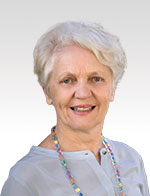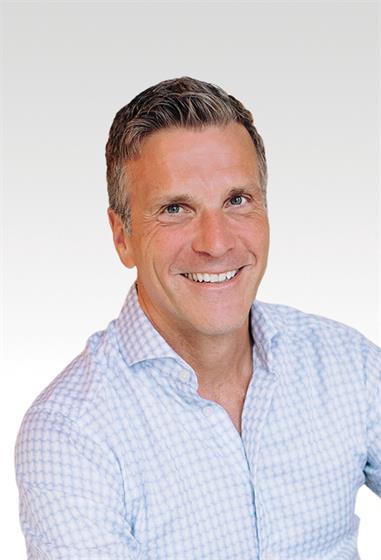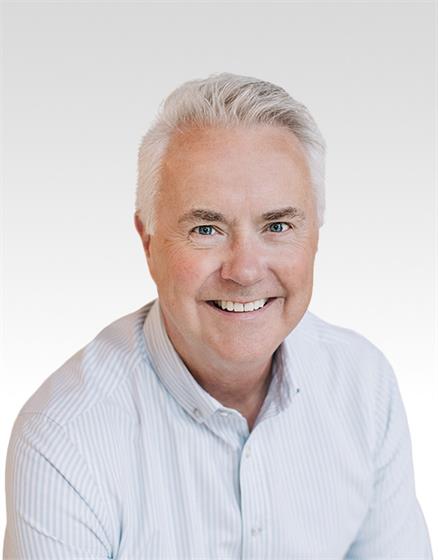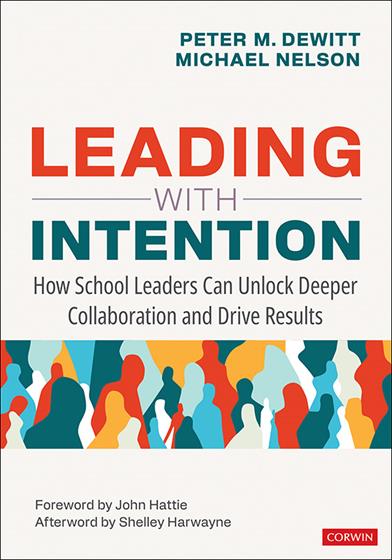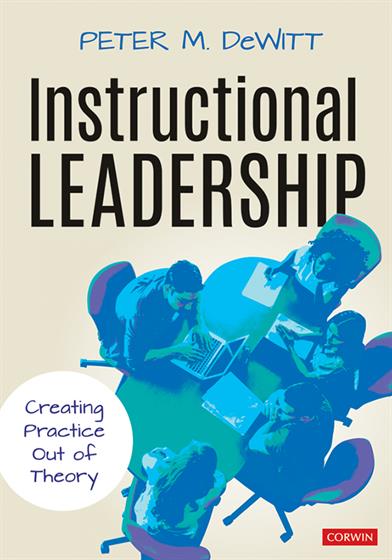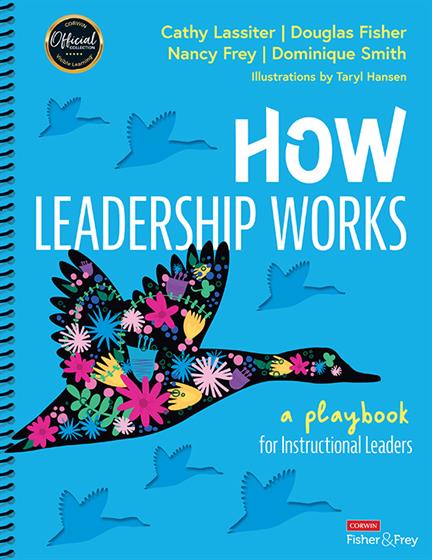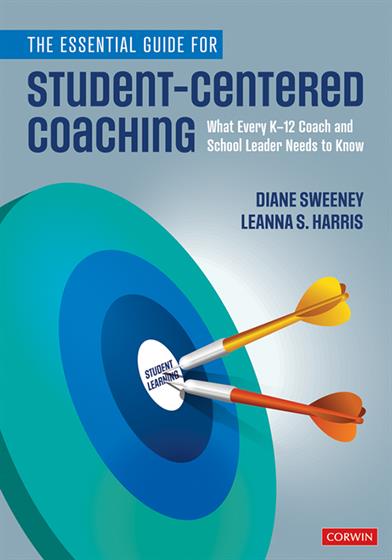[00:00:00.00] [AUDIO LOGO]
[00:00:00.30] NARRATOR: Welcome to Corwin's Leaders Coaching Leaders
Podcast, with hosts, Peter DeWitt and Michael Nelson. This podcast is from
education leaders for education leaders. Every week, Peter, Mike, and our
guests, get together to share ideas, put research into practice, and ensure
that every student is learning not by chance, but by design.
[00:00:25.85] PETER DEWITT: We're a lot closer than we usually are. We're
usually on the opposite coasts, but--
[00:00:30.50] MICHAEL NELSON: Now we're in Australia.
[00:00:31.85] PETER DEWITT: I know we're in Australia doing some
facilitating some workshops. And I have to admit, this to me was a great
podcast interview because it's somebody I deeply respect and have for years.
And I've gotten to know her over the past few years. But to be in Melbourne
facilitating workshops and then get the chance to talk to Viviane Robinson is
amazing.
[00:00:52.43] MICHAEL NELSON: Distinguished Professor Viviane Robinson.
[00:00:55.62] PETER DEWITT: Yes. So, our guest--
[00:00:57.33] MICHAEL NELSON: Amazing.
[00:00:57.80] PETER DEWITT: --Our guest today is distinguished professor,
Viviane Robinson. She has been at the University of Auckland in New Zealand,
but she's also a visiting professor at University College of London. She has
devoted her academic career to investigating and developing the capabilities
leaders need to work productively with their teachers to improve student
well-being and achievement. And yes, I am reading part of her bio, but the
reality is that student-centered part actually came out in the interview right
at the beginning.
[00:01:30.26] MICHAEL NELSON: It did. And you'll hear that she really is
keeping students at the center. And I want you to really engage in this podcast
because it's really worthwhile.
[00:01:43.51] PETER DEWITT: Yeah. So when you're listening, just keep in
mind that she has had such an influence on so many people. Michael talked about
the influence that she has had on him, but also just the research and the
citations alone that I just feel like she is a wealth of knowledge, and 30
minutes is never going to be enough when you're talking to Viviane Robinson.
[00:02:06.52] But please enjoy the interview because she focuses on
students. She focuses on what leaders need. And this is an interview, to me,
it's like a master class, but it's also an interview that you're going to want
to listen to several times over. So enjoy the podcast.
[00:02:23.70] [MUSIC PLAYING]
[00:02:27.31] ANNOUNCER: Picture yourself popularly known among staff
members as the reliable go-to person who makes meaningful change happen. This
is possible when you equip yourself with robust strategies and tools from
Corwin's Leadership Workshops. Sign up today at corwin.com.
[00:02:43.65] PETER DEWITT: Viviane Robinson, welcome to the Leaders
Coaching Leaders Podcast.
[00:02:47.41] VIVIANE ROBINSON: Thank you, Peter and Michael.
[00:02:49.76] PETER DEWITT: It's very good to see you. Thank you for taking
the time to talk with us tonight.
[00:02:55.22] VIVIANE ROBINSON: Yeah.
[00:02:55.56] PETER DEWITT: In our podcast, we always have a theme that
we're focusing on. And our theme this season is actually focusing on leading
with intention. And you've done so much work around things like leadership
workload and instructional leadership. How do leaders in this day and age lead
with more intention, given all the complexities of the job that they have?
[00:03:20.47] VIVIANE ROBINSON: Well, one of the keys is to keep in mind
what the distinctive purpose of educational institutions is. And the
distinctive purpose of an educational institution is to serve students. You can
talk about that in terms of three main purposes or goals of educational
institutions more broadly. One is preparing students to lead fulfilling and
worthwhile lives, including fulfilling employment.
[00:03:59.64] The second is to develop, to socialize students into various
communities of different types, both communities of which might be racial,
religious but cultural, but also disciplinary communities, like induction into
the community, what it is to be a mathematician. For example, for senior
students, so there's the socialization purpose. And then the third purpose is
to develop autonomous self-regulating learners.
[00:04:38.13] And so that's sort of my elaboration of the moral purpose of
the job. And I think ever since we started talking about instructional
leadership, we know that leaders espouse it, they mostly want-- although I've
met exceptions, they mostly want to be instructional leaders, but they regret
the fact that they spend so much of their time not being instructional leaders.
[00:05:07.59] And so how can I do more of leading with intention, which for
me, means leading with that moral purpose in mind. And there's a number of
things. One is to be able to realize that when they're working with adults, the
primary purpose is not to serve adults, but to serve students. And of course,
have to have the adults with you. If they're not on the bus, you're not going
to be able to serve the students, no question.
[00:05:44.66] But they need to be able to navigate the incredible number of
times in which serving students and serving adults are in tension. And whether
it's their bosses who want them to implement a particular program, which a
principal doesn't think serves their students well, but serving the adults or
their superior will mean implementing it in a compliance mode that's serving
the adults.
[00:06:18.34] Whether it's-- I'm thinking of a senior leader in a high
school, and that senior leader was a very relational leader. So she prided
herself on having an open door policy. She had been delegated to lead a strand
of the school improvement program, and she routinely did not lead that strand.
She was not leading with intentionality because she allowed staff who loved her
dearly to take up her time to be able to have cathartic sessions where their
frustration at their last lesson or whatever, she would listen and listen and
listen.
[00:07:05.52] So she's leading with intention perhaps. Intention of getting
along with the adults, but she's not leading with the right intention, which is
pursuing the moral purpose. Her job is not to be a counselor to the adults, or
at least certainly not to the neglect of her role in improving teaching and
learning for defined group of students.
[00:07:28.73] So those are just having that in mind and being cognizant of
who am I-- in every meeting and conversation, who am I serving here. How is
this going to help the students for whom I'm responsible. So that is key.
Another thing is to do what Simon Breakspear was talking with him last night,
what he calls pruning, and you call day implementation, which is how do you
actually have a mindset where you know and you know in time what's not working?
[00:08:10.47] You know that your teachers need to get stronger in managing
small groups. That teaching to the whole class. They're not teaching in a
differentiated manner. They're not teaching small groups. And then a good
leader discovers why they're not. And they discover that the teacher is not
differentiating and having small group teaching, because the teacher doesn't
know how to keep control of a whole lot of small groups when they're attending
to just one or two.
[00:08:53.22] So, a leader who is leading with intention understands that
the way you help the students of that teacher is to help that teacher manage
small groups so that teacher can then do a better job of teaching maths and
science problem solving to a year level, which doesn't have sufficient subject
specific literacy, for example. So that is absolutely key, knowing having that
strategic intentionality in mind all the time.
[00:09:34.95] Then that leader discovers that teachers are not going to get
on the learn behavior management improve those skills bus because there's so
much else going on in professional learning already and that agenda is crowded.
So instead of adding on another piece to the professional learning agenda, they
have to postpone or stop something.
[00:10:04.28] And that's, again, where leaders need backbone because there's
often contracted staff member who everybody likes, who's delivering some of
that professional learning. There's a excellent external facilitator. There's a
lobby group of parents who want this particular program to continue and on and
on. So being able to make transparent decisions about what we're going to take
off the table is absolutely key. So those two things, I think.
[00:10:44.27] One is being constantly aware of what's my moral purpose. And
my moral purpose is to serve the adults, not to serve-- sorry-- to serve the
students, not to serve the adults, per se. And the other is being able to take
stuff off the table. I'm sure there's more to it than that, Peter, but that's
what I can think of at the moment.
[00:11:07.24] PETER DEWITT: I think that's pretty outstanding. Actually, I'd
like to ask you a follow up because I said on an advisory board for a while
with Helen Timperley, we were talking about implementation and she said, I told
you, nobody's going to do that. And she sent me a research paper that you and
she actually wrote back in 2000, and it was based in a school in New Zealand.
And you both had said that teachers contribute to their own workload more than
any initiative does.
[00:11:38.88] They just don't take things off the table. And I have to
admit, in the past couple of years when focusing on the implementation, you
know that abandonment of low value practices, we will ask audiences, what is
something you would de-implement? And 100% of the time, and it just kind of
struck us after a while, we had thousands of people that were answering this
question.
[00:12:01.27] And 100% of the time they mentioned something that they really
didn't have control over. They weren't looking at their own practices at all.
So very interesting to read your research from 2000 with Helen, and just really
keep getting faced with that. And yeah.
[00:12:21.85] VIVIANE ROBINSON: And if I can add to that, Peter, in terms of
that particular article, what we discovered was that it was a large high school
and they had over 20 initiatives just serving Pasifika students. And the
principal was not aware that there were 20. So the strategic overview of the
senior leaders just wasn't in place. But then asking the principal, why did he
agree to all of these. And the reason is because he's dealing with.
[00:13:04.41] Requests from conscientious, well-meaning teachers, each of
whom comes to the principal and says, I think we need a mentoring program. I
think we need a breakfast program for this group of Pasifika families. And so
the principal saw it as his job to support the adults by saying, well, if
you're prepared to volunteer your time and effort, go for it. And completely
and did that time after time over the years and had no strategic oversight of
the fact that there were now 20 of these.
[00:13:43.47] So there's a strategic, a real gap in strategic capability.
And no evaluative thinking around, well, what do we know about the impact of
the other 19. And it came to a head because there weren't enough volunteers to
staff them all at the end.
[00:14:13.38] MICHAEL NELSON: First of all, it's an honor to even be in this
conversation. So you need to know my heart is pounding. And thank you for all
you've done and for helping me in my leadership journey. About two or three
weeks ago, we interviewed Zaretta Hammond, and what was so phenomenal about her
is exactly what's phenomenal about you is the students. It's the students.
[00:14:37.09] And we were with a lot of educators, leaders, and we interview
a lot of individuals. And oftentimes, the word students doesn't come up in the
interview or it doesn't come up in conversations. And so thank you, for number
one for saying that. It reminds me of Dr. Richard Elmore. He always kept
saying, keep the main thing the main thing.
[00:15:01.30] VIVIANE ROBINSON: The main thing. Yeah.
[00:15:02.39] MICHAEL NELSON: Yes. And it was just over and over again when
I was in his classes, that's what he kept saying. And it has been kept in my
head and heart for over 30 years. But I would love to ask this question for my
son. So my son is now in his third year of being a principal of a middle school
in the State of Washington,
[00:15:24.16] And I miss dad. And his dad was gone through the journey, been
principal, been a school district superintendent for 14 years. And we do lots
of conversations. And I try to frame our conversation. When we're in
conversations, I try to ask more questions than give responses. So what would
be two or three questions that you think are important to ask every young
leader moving into a leadership position?
[00:15:56.28] VIVIANE ROBINSON: Yeah, right. Without knowing the context,
that's quite a tough question to answer. But I would say to how well do they
know the students?
[00:16:14.08] MICHAEL NELSON: It's back to that core.
[00:16:17.17] VIVIANE ROBINSON: Yeah. How well do they know their students?
Not how well do they know their staff, though, that's of course, really
important. But how well do they know their students? That would be one of my
keys.
[00:16:30.23] And I mean, we call-- we've discovered this thing called
student voice. And the various methods for asking students, what their
experiences are, which seems pretty obvious, actually. But I'm working a lot
with Australian leaders, school and system leaders on a methodology for school
improvement that I described in my latest book, called Virtuous Educational
Leadership.
[00:16:58.93] And in that book, I talk about the systematic methodology, and
I also talk about the dispositions that are needed, the character traits that
are needed, which can be learned, which can be developed. We're not talking
about personality here in order to do the critical work of school improvement.
[00:17:27.98] And so, I think the second question might be, what is your son
trying to improve? And is the focus of the improvement grounded in a group some
student data? A group of students, who whether it's well-being data, or
achievement data, or cultural safety, sense of belonging doesn't matter. But
what is the focus for improvement?
[00:18:08.49] And can your son identify the students who are going to be the
recipients of this improvement? And one of the things I'm doing in Australia is
trying to shift the focus from-- we've measured the adults against five
dimensions of leadership or whatever. And we've discovered that this leader is
weak on this dimension, and this dimension, so let's fix the leader on that
dimension.
[00:18:38.90] Now, that's an adult focus for your improvement work. Instead
of saying, well, you want this principal to be a stronger instructional leader,
you might be quite right, that might be really important. But who are the
students that need to benefit from the principal's stronger instructional
leadership?
[00:19:04.00] And unless you identify those students, then you're just
arguing with the adults about whether they need to be stronger instructional
leaders or not, as opposed to. I've got a hypothesis, which is that if you're a
stronger instructional leader, those students will benefit, and the teachers of
those students will benefit. And that's testable. That enables one to evaluate
impact.
[00:19:29.83] The other one, well, you can see whether they've gone up on
the scale, but that's just adult data. That's not data that's grounded in
you've improved something for the benefit of a identified group of students.
[00:19:45.56] MICHAEL NELSON: Thank you.
[00:19:46.66] PETER DEWITT: I'd like to go back to something you were
talking about earlier when you were given this scenario of the principal going
in to help the teacher with smaller groups. What are the things that we often
face is we will have leaders that will say that, they don't feel like they have
the credibility to go into certain classrooms because they didn't teach that
content. It often comes up, whether we're talking about primary or secondary.
[00:20:11.88] And in fact, we're in Melbourne right now, running workshops,
and your name definitely came up yesterday when we were facilitating workshops.
And it even comes up, you know, comes up no matter where we are.
[00:20:23.28] What are our leaders to do if they don't feel like they have
the credibility to go into that classroom and help those teachers with those
smaller groupings because they don't know the content? Are there--
[00:20:39.51] VIVIANE ROBINSON: Yeah, that's very common. That's very
common, that feeling, especially in principals and senior leaders of large
schools. That's why you have middle leaders. That's why you have faculty heads
and heads of learning areas and things like that. Now, the senior leaders
responsibility is to know what the student data shows across the school, and to
be able to disaggregate that and discover pockets where improvement is needed.
[00:21:12.97] Then to go from that to identify, well, who are the teachers
and middle leaders of those students? That's the senior leader's job. And then
the senior leader's job is to get those middle leaders and their teachers on
the improvement bus.
[00:21:37.89] Now, from that point on, it might be a process of following up
with reporting because I don't know enough about the teaching of mathematical
problem solving and/or writing or whatever it is to be able to solve this
problem. That's very common. So they need to find either internal, external
expertise that is directly relevant to the student outcome difficulties that
have been identified. So that's one answer.
[00:22:16.92] Another answer is that there are some views that-- there are
generic good teaching practices. And I think in my student-centered leadership
book, I identified four questions that can be asked by any leader, in any
lesson, if they go in and talk to the teacher and the student. So that's in the
dimension of leading teaching in leading teaching and learning, not the
professional learning dimension. I think, it's in the one before.
[00:22:59.15] So there are four questions about, does the teacher have
intended learning outcomes? I mean, sort of assessment for learning basics. Do
the students the success criteria? So that they can self-regulate and use
metacognitive strategies to determine their progress.
[00:23:21.01] Are the students engaged with what they're supposed to be
engaged with, which means cognitive engagement, not behavioral engagement. And
to what extent are they successful in achieving the intended learning outcomes?
Now, those are questions that any leader can ask of any teacher, in any lesson.
[00:23:43.41] And then also you've got the research on good teaching
strategies that comes out of cognitive science. Has the concept been explained?
Has the concept been demonstrated? Is all of that tested and checked before
students are put into groups to discuss things and do happy, jolly
participatory things?
[00:24:10.94] I mean, that the explicit teaching processes, which just as I
read them, explicit teaching is you actually teach stuff before you ask kids to
do. You don't ask kids to discover stuff. You can do that when they've got a
well-organized foundation of relevant knowledge.
[00:24:35.72] But if they s have the background knowledge, then please don't
do a whole lot of participatory stuff. Now, that's well-known now, and that's
generic across any subject. So I've given you two answers there, Peter, really.
One is that there are some genetic-- sorry, generic. There are some generic
strategies that are applicable to any lesson in any subject. But there are also
strategies that a senior leader should be using to access relevant to
expertise, either from within the school or outside of.
[00:25:26.73] PETER DEWITT: I wouldn't expect anything less from you than to
give me at least two answers.
[00:25:31.02] [LAUGHTER]
[00:25:33.12] MICHAEL NELSON: I Love it. And I love it. I'm going to ask a
question, and it may not be something that's in your memory because you get
interviewed a lot and you do different things. But in preparing for this and
getting to know you at a deeper level than the research and my practice that
I've done over the course of the years. You said something in an interview a
few years ago, everyone should exercise leadership.
[00:26:05.25] VIVIANE ROBINSON: Yeah.
[00:26:06.41] MICHAEL NELSON: Can you expand on what you mean by that?
[00:26:09.34] VIVIANE ROBINSON: Well, leadership is a particular type of
influence process. It's not good enough. I don't think to just say it's the
exercise of influence because there's all sorts of nasty ways of exercising
influence, like force, coercion, and manipulation, and we wouldn't call those
leadership. So we need to be much more nuanced by than just saying leadership
is influence.
[00:26:36.27] Leadership is influence that is sourced in one's ideas,
expertise, relations, ownerships or positional authority. Now, positional
authority is available to those who have formal leadership roles. But the other
two sources of leadership influence are open to anyone. Relationships and ideas
and expertise.
[00:27:01.47] So, you're in a meeting-- and you're in a team meeting and you
think as a teacher that the meeting's not being run very well. It's a bit all
over the place and it's not very focused. So what do you do about it?
[00:27:25.75] So, we see too many teachers who will do nothing, put up with
it, complain and gossip about it after the meeting, because they're not-- in
other words, they will not exercise leadership to be able to say, well, I don't
know about you folks, but I think we're a bit off the agenda we set. Can we
stop and check? That's an exercise of leadership.
[00:27:50.61] And it's far too rare among teachers. That ability to actually
be helpful, to influence things in the direction that probably everybody wants
to go in by just describing what's happening. And taking some risk-- it's just
taking some responsibility, and also being collegial, helping. Instead of just
waiting for a team leader to dig themselves into a hole or dig themselves out
of a hole, they are there being helpful.
[00:28:26.38] And so that's what I mean when I say that everyone should be
exercising leadership, moment to moment in any context.
[00:28:37.72] MICHAEL NELSON: I just think you just dramatically nailed
intentionality. Intentionality leading with intention is not just about a
single person leading with intention when you're a part of an organization.
It's about everybody leading with that intention. So thank you for that. That
was exquisite.
[00:28:54.92] PETER DEWITT: And with that being said, because I was thinking
the same thing, actually, that Michael is just considering. So we're doing a
lot of work around collective leader efficacy. And the definition we're using
is a shared understanding, in a shared understanding, engaging in joint work,
the work Judith Warren Miller-- sorry-- Judith Warren Little, and then
collecting evidence of impact.
[00:29:22.34] And I think one of the last questions that we'd like to be
able to ask you because we want to respect your time is, how do leaders keep
developing that shared understanding so in a way where they can-- because I
often find that the reason why people don't step up to be a leader is because
of the status piece. Like, I'm on a team with my school principal, but my
school principal is my superior. So I can't speak up because my principal is
going in this direction.
[00:29:54.20] But for us collectively, our efficacy is about the leader
lowering their status and raising the status of the people around them. But we
often don't have a shared understanding. We have a common language, but we
don't have a common understanding of the words we use in education.
[00:30:09.25] So how do leaders actually help do both of those
simultaneously? How people understand that they could step up to be the leader,
but at the same time make sure that they're engaging in a shared understanding?
[00:30:22.00] VIVIANE ROBINSON: Well, yeah. I mean, I think Judith Warren
Little's notion of joint work is absolutely key, and in the collaborative
complex problem solving work that I've been doing across Australia. The pivot
for that is a shared improvement task, which is harder to get in a network than
in an individual school, but it's possible to get because it's possible to do
it.
[00:30:56.55] But shared understanding of what? Of what? So what is the
task? Why are we here? What's the point of yet another meeting? I've got enough
meetings in my school, why should I be going to a network meeting? And if you
don't have an important shared task, then you can't answer that question.
[00:31:22.52] Once you've got the shared task, then you're working on
developing the shared understanding of the shared task, of the task to which
we're all committed. So, that's a focus for the shared understanding. Then how
do you get a shared understanding?
[00:31:38.96] Well, this is where addresses stuff is really important.
You'll never get a shared understanding if you keep talking at a level of
abstraction, like, explicit teaching. That's abstract. What does it mean? What
does it look like? And in education, there's just so many of these abstractions
that people think they understand the same way, whether-- and of course, the
reading wars balanced, literacy, structured, literacy, explicit teaching,
positive, being positive.
[00:32:14.34] All of these are at a stratospheric level of abstraction, and
you'll have shared words, but you won't have shared understanding, in fact,
you'll probably have shared misunderstanding. So that is a key that a leader,
in terms of building collective efficacy. Those are preconditions, I think, for
collective efficacy.
[00:32:40.89] Now, the other one you're talking about is power, and power
differentials. And boy, people have incredibly strong, untested beliefs about
power. The middle leader doesn't want to talk to the principal because there's
a power differential. And yet, they will attribute a whole lot of beliefs and
motives to that principal. Like, the principal doesn't trust me, and I'm being
overlooked for being acting principal when the principal's away.
[00:33:23.84] The other two people on my team have been acting, and I
haven't been asked. And the reason I haven't been asked is da da da da. And so
they have this theory about why-- what the principal is doing around appointing
and acting principal for when they're at a conference for four days or
whatever. And then they have a theory, which prevents them testing their
theory. And that is a theory of power.
[00:33:55.28] So I can't do that. I can't exercise upward influence because
I'll be seen to be complaining, I'll be seen to be looking after myself, I'll
be seen to be unhappy, whatever or whatever, and so there's a stalemate. I
mean, a really astute principal in that situation can initiate talking to that
third person about why they haven't been made acting principal.
[00:34:31.05] And that's a way of reducing the power differential, and this
would be a quite difficult conversation for both parties so that the
conversation can happen. And also be a really skilled listener. So that when
they hear stuff, they actually listen to it and keep their mouth shut
sufficiently long to have the other person say what they need to say. I mean, I
coached a very good deputy principal through a conversation exactly like this.
[00:35:10.73] And she had the first conversation and came away convinced
that the principal wasn't listening, wasn't going to do anything about it, da
da da. And then asked her to role play the conversation that she'd had with me.
So she said to me what she thought she'd said to the principal. And within two
minutes I stopped her and I said, no wonder the principal did nothing.
[00:35:35.24] You haven't actually described. You haven't said what you're
concerned about. It was so minimized. It was so fluffy. It was so vague. So
that principal, it wasn't the power of the principal that was the problem
there. It was the attributions of power by the deputy.
[00:35:58.50] PETER DEWITT: And I think, you just reminded me of a paper
that of yours that I actually printed out and brought on the way to Australia,
which is a capabilities required for leading improvement challenges for
researchers and developers. And you talk about that. You talk a lot about the
fact that we talk around the problem. So that's a perfect example.
[00:36:23.36] I want to say that, for me, a highlight in my professional
career, was when I edited the Corwin book series on leadership, and you wrote
one of the books. That will always be just a highlight for me. And, honestly,
as we wrap this up, talking with you is just a masterclass.
[00:36:43.61] And I know Michael can speak for himself, but I am always
honored, not just when I get to talk to you, but also when I get to read what
you write. Because I think what you write just so speaks to me, and has had
such a huge influence on what I do, not just as a leader, but as somebody who
actually writes books and facilitates workshops. I always keep your research
close to where I am because I feel like it's just such an incredible guide.
[00:37:12.84] So, thank you so much for being on the Leaders Coaching
Leaders Podcast.
[00:37:17.28] MICHAEL NELSON: You are.
[00:37:19.01] VIVIANE ROBINSON: It was a pleasure to meet you, Michael, and
to reacquaint again, Peter. So, thank you so much.
[00:37:26.42] MICHAEL NELSON: Absolutely.
[00:37:26.89] [MUSIC PLAYING]
[00:37:31.13] OK. We just had an amazing 30 minutes with distinguished
Professor Viviane Robinson. And you know what, I went personal-- I went
personal. My son is in his third year of being a principal after four years of
being an assistant principal. And I wanted to know what questions would you ask
a young leader. And her first question was so simple. But not, Peter, it was so
perfect. It's, how well do you know your students?
[00:38:05.51] You like, we should be wearing T-shirts that says with the
question, how well do you know your students? That's what we should start our
workshops.
[00:38:13.02] PETER DEWITT: No, I love that you asked that question, too.
And for me, it was about, when she was talking about everything, from the power
differential, to how we get everybody to lead, and we could go into the
discussion around collective efficacy. But yeah, she always kept it at the
heart of the student. So we want to say thank you so much for listening to this
podcast interview with Viviane Robinson. She has been fantastic to be able to
talk to.
[00:38:41.87] And as always, we get feedback from people who are listening
to the podcast. Actually, in the past few weeks, we've been on the road. We've
been in Canada, we've been in the US, we're in Australia. And there are people
that actually come up to us to talk about the fact that they listen to the
podcast. So, please, always give us your feedback. We love to hear from you.
But thank you again, and until next time, Michael, maybe we'll be able to do
another interview from Australia.
[00:39:02.57] MICHAEL NELSON: That would be great. Who knows.
[00:39:05.28] [AUDIO LOGO]

